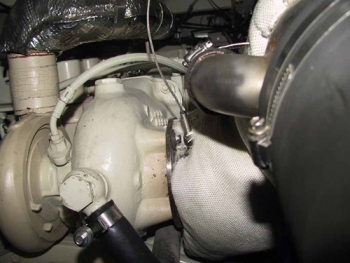MVDirona.com |
||
|
|
|
 |
|
Diesel Engine Overload: Crankshaft Bearing Failure
James:
My 11 year-old 1000-hour 38 HP Yanmar 3JH2E Diesel on my 36 foot sailboat experienced crankshaft bearing failure. The center bearing disintegrated while the other two bearings remained in perfect condition.
The circumstances were the prop shaft became entangled in lobster fishing gear during a passage through the Cape Cod Canal. In order to make any headway to keep control and get to a safe anchorage, I had to apply full emergency power to a heavily overloaded engine. The center crankshaft bearing failed, while the other two survived. Because the crankshaft was heavily scored, the engine was a total loss, and needed replacement.
The insurance
surveyor, claimed that this was a "mechanical failure due to latent defect" "or
possibly faulty maintenance" and recommended that the claim be denied, despite
clear evidence that the prop and shaft were entangled. I would like your opinion
of the possibility that heavy lugging at high power settings caused heating, and
overloading, and could be responsible for the center bearing being spun on the
crankshaft. Response: These things are hard to know with certainty. Some observations:
In your case, you were essentially running wide open with what is effectively an over-propped engine. The engine probably is properly propped but, with the shaft bound up, it's as though you were over-propped. This will shorten life and could lead to bearing failure. Bearing failure is not the most common failure mode but it can happen that during over-heat, the bearing set with the least clearance can bind-up and spin.
Personally, I would either drift if away from danger or drop anchored to slow the drift if near shore and free up the shaft when faced with this problem in the future.
The failure you have encountered could have been contributed to by dirty oil or debris in the oil as well. If the other bearings are not scored and look in good shape, you have good evidence that this isn't the case.
If the engine has few hours and is very well maintained, you have a good case. Is the engine room super clean, the engines expertly maintained, etc. If so, you should push for a better answer from your insurance company. If not, you should accept it as a combination of wear, age, maintenance, and bad luck. It's a gray enough area that the judgment call will be influenced by many factors including age, hours, maintenance, cleanliness, the location and conditions you faced (was it absolutely required that you press on?), the mood of the investigator, the phase of the moon, ...
Best of luck,
-- James
Back to Diesel Engine Overload Introduction and Follow-up Questions
|
||
| Comments or questions? Feel free to contact us at Jennifer@mvdirona.com or jrh@mvdirona.com. |
Copyright 2012 Jennifer and James Hamilton |
|